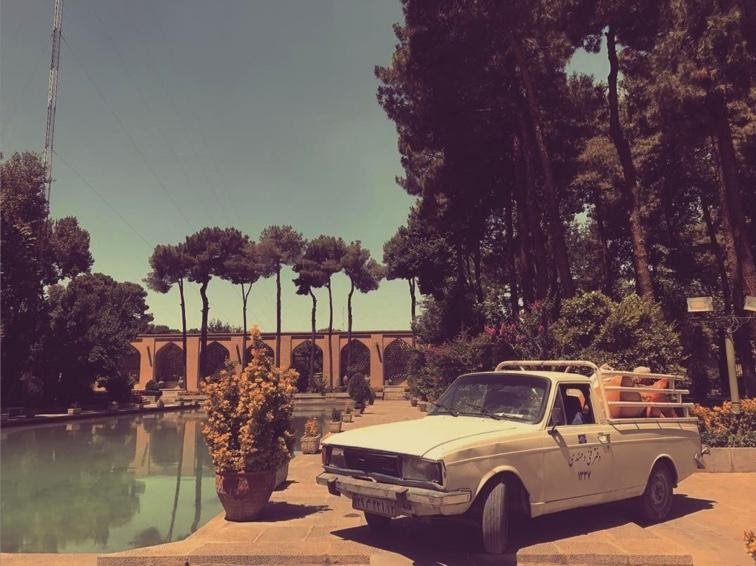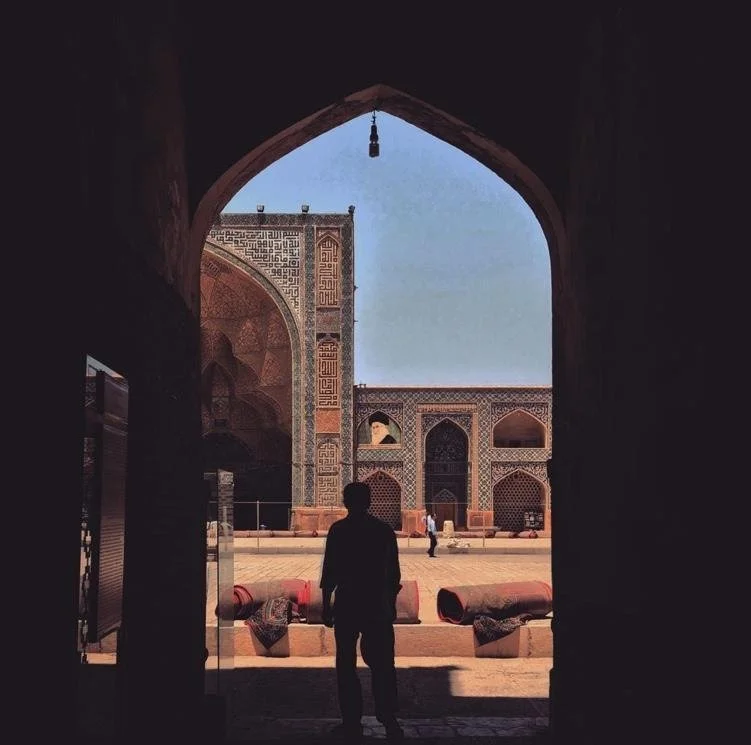Exploring home and heritage through Iranian tea rituals
Photos courtesy of Sheyda Monshizadeh Azar.
Words & interview by Sahar Esfandiari, edited by Dalia Al-Dujaili
Sheyda Monshizadeh Azar’s journey to launching luxury tea brand Persian Apothecary is linked intrinsically with her Iranian culture and heritage. Angered by the mainstream media’s overwhelmingly negative portrayal of Iran and Iranins, Sheyda’s motivation was largely fuelled by the desire to create an authentic representation of the memories of her homeland that she holds so close to her heart.
There is a certain sadness connected to Sheyda’s experience of being British-Iranian, as is often the case for those of us who are physically disconnected with the idea of home and struggle to see loved ones as often as we wish. She has also faced discrimination as a business woman directly as a result of using the word ‘Persian’ in her business name, a setback that has only motivated her more to establish a successful brand with a visible and undeniable link to an area of the world that is deeply misunderstood.
Sheyda’s mother, Nazy (centre) in West Azarbaijan, Iran, 1956.
What inspired you to start Persian Apothecary?
It’s pretty self-indulgent if I’m honest. It’s a means a lot for me to preserve and share my heritage and the memories I have of Iran, the place of my birth. In many ways I have been contending with a feeling of displacement, as I no longer travel to Iran as frequently, and that fills me with constant nostalgia and melancholy.
A few years ago, when I got back from Iran, and I knew I wouldn’t be back for the foreseeable future, I was filled with a sense of panic. I was fortunate to capture that energy and have this bizarro fantasy of starting a tea company that would be an antidote to my pain.
I can be quite an angry person and am perpetually angry about how Iran is displayed in the media and of Iranian ingredients being commodified by huge corporations who could care less about the people of Iran. I examined the tea industry as a whole and found many elements to be repulsive, with a strange fascination with colonialism and empire.
“There’s something so beautiful about recreating scents that linger in my memories, it’s therapy.”
Despite it being this very opulent, luxurious project, I can make a minuscule impact by creating a positive image of Iran whilst providing some critique of the unacceptable marketing that dominates a lot of the luxury tea industry. These teas represent the beautiful memories of Iran and my upbringing, the richness and the complexity of the places and experiences which were formative for me. I connect viscerally with scent. There’s something so beautiful about recreating scents that linger in my memories, it’s therapy.
Tell us about how your heritage and culture have informed your work.
My heritage and culture are the great defining forces of my life. There isn’t a single part of my project that is entirely original. The colours, poems, flavours, photographs - everything really is from Iran and culture. Even my personality and ideas. My upbringing forced me into this very emotional and sensitive person. It is a culture of poetry, of love, of appreciation for beauty. I have an incredible responsibility to ensure this project has maximum integrity because of the very fact my heritage and culture are part of it.
Tea drinking rituals in Iran are such a key part of everyday life, what do they mean to you personally?
I have completely lost perspective. I don’t actually drink tea every day, I associate tea and the ritual very strongly with my family and since starting the business in 2017 I don’t think I’ve spent more than two weeks cumulatively with my parents. So, actually I don’t drink as much tea as I do coffee because I find it all quite depressing.
But when I do, and I mean especially now, much more now, seeing this beautiful finished product, I do feel this cathartic connection and relief.
Image courtesy of Persian Apothecary, 2022.
The photography used on the boxes of your blends are striking, can you tell us more about that?
You know, there was so much luck involved with this project without which it would have been impossible to get off the ground. Tahmineh Monzavi is an exceptional and brave Iranian photographer and she agreed to work with me because she appreciated the quality of the project. I am so proud that her photographs are displayed across my packaging.
Her work speaks for itself but I find her photos to be hauntingly good. It means so much to me to showcase talented Iranian artists and it’s an honour to have been given the chance to use her work. I hope I can continue to use this business as a vehicle to showcase the talent of Iran and Iranians today.
“Tea is obviously like the gold standard in colonial commodities. Wars and revolutions have been started because of tea.”
You’ve chosen to share a series of personal stories about people in your life, how significant were these to the inception of Persian Apothecary?
Oh, there’s no way it would have happened otherwise. I will give you an example. The only photograph that’s not one of Tahmineh is on the blend Driving in Tehran. That’s a photo I took of my cousin. She was my best friend in Iran, I haven’t seen her in 5 years. Maybe some of the readers will know what it’s like to miss someone so much that you find it hard to speak to them. As a result, I have this fear that she won’t know how much I wish she was a bigger part of my life. And I feel crushed with guilt. Which only makes matters worse. Driving in Tehran is an ode to the simplicity and joy we had just us, driving around, cruising and hanging out together and with my neighbour in Tehran, Raha. I mean so, to answer your question, very significant.
I’d like to get into your thoughts about tea and colonialism, tell me more about this.
Tea is obviously like the gold standard in colonial commodities. Wars and revolutions have been started because of tea. So I find it interesting, and as mentioned earlier, repulsive, that there’s a glorification of imperialism & colonialism across a lot of the marketing materials of these “Imperial tea houses”. I wanted to do something which was really far removed from that, where I could show a contemporary image of Iran and make it modern and relevant.
Photos courtesy of Sheyda Monshizadeh Azar.
As a business woman of Iranian heritage, what are some of the unique challenges you have faced and overcome in the process of launching your brand?
I have to say, I feel incredibly lucky and I know that some of my successes are mostly based around luck, my upbringing, opportunities I have been given and whilst I work hard, there are a lot more people working a lot harder. Having said that, being Iranian brings with it a lot of challenges that I don’t think most people would stand for, and for some reason we collectively, as Iranians, put up with it.
Sanctions mean that we can not import goods easily from Iran, so from the offset, I knew my idea had to be conceptual rather than directly working with goods from Iran. And then, the name of my business, Persian Apothecary, just having the word Persian has meant that Instagram limited my account for the first 2 months I started business and Paypal still doesn’t work on my Shopify website. They don’t explicitly state that it’s the reason but there are too many similar cases for it to be an accident. They actually will not respond directly to explain it, it’s this next level corporate gas-lighting situation. But a few other businesses with Iran/Persia in their title/description have faced similar issues. I’m not naive, my family has had 5 bank accounts frozen in the UK by British Banks. Lloyds, Barclays amongst others.
Financial services, big companies like Instagram, Wise, Paypal - they’re absolutely not going to risk their bottom line doing business with Irans & getting fined. So they’re using a blunt instrument which has collateral damage, and us Iranians are that collateral damage. It’s outrageous that my transfers are routinely stopped because of security concerns. It’s embarrassing and already, people can have low expectations of you because you’re a young woman of colour from “Iran” & then your payment doesn’t go through, so no doubt alarm bells go off.
I’m entering a saturated, competitive market and I am one single person. Every single obstacle is a burden. This obstacle being my very identity and the identity of my product is frustrating and bewildering. Anyway, one day when I’m rich, I’ll be more litigious. Watch out! Yet, I guess it motivates me because this product is bringing a very different image of Iran to the fore, filled with beauty and stories, far removed by the images the media depict of Iran.
It’s something that I care deeply about and I think the demonisation and dehumanisation of Iranians is a precursor to war, of rationalising tools such as sanctions that are devastating people’s lives in Iran. But you know, I think younger people (Gen-Z particularly) are more open minded and nuanced, even the fact Selfridges has supported this brand tells you something in the water is changing. I have hope.
What’s next for Persian Apothecary? How can we support?
I want the brand to support the culture and creativity of Iran, I’d like to have events that highlight culture & arts. I don’t know how and what this will look like yet, so I don’t want to make promises I can’t keep. But please follow us on Instagram and keep me honest with feedback.
“Don’t let the perfect be the enemy of the good, there’s lots I want to change with my product but I had to make compromises.”
Anything else you’d like to tell Azeema readers?
Maybe you are reading this because it’s the sign you need to launch your own thing. Don’t let the perfect be the enemy of the good, there’s lots I want to change with my product but I had to make compromises.
Some of it gave me the ick and I was super concerned that people would judge me for making such an expensive product that wasn’t immediately “socially responsible”. But you have to start somewhere and have confidence that you have integrity as a person to do the right thing.







